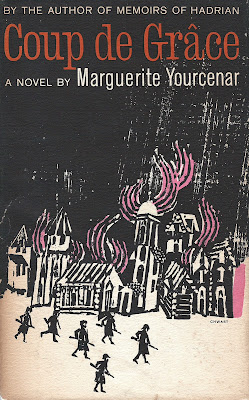 |
| Ynglingen och döden = Young Man with Death (1908) Gösta Adrian-Nilsson (GAN) (Swedish, 1884-1965) Gouache and watercolor on cardboard 56.5 x 38 cm (22.2 x 15 in.) |
Wednesday, January 26, 2022
Ynglingen och döden (Young Man with Death) by Gösta Adrian-Nilsson (GAN)
Tuesday, January 11, 2022
Coup de Grâce by Marguerite Yourcenar
 |
| New York : Farrar, Straus & Cudahy, 1957 |
Not released in English until 1957—after the success of Memoirs of Hadrian—the original French edition of Coup de Grâce had been published in 1939. The novel opens with our main character Erick von Lhomond, recently injured during the Spanish Civil War, returning to Germany by way of Italy. Among the other mercenaries, he begins to tell his story of war, going all the way back to the Bolshevik Revolution.
Although he had trained to join the German military during World War I, he was still too young to fight before the war ended. His father, having died at Verdun, left the family in debt. Between his need to fight and his family's need for money, he decides to join German forces fighting the Bolsheviks in Kurland (Courland) in what is modern-day Latvia. Erick had spent the happiest times of his youth there with relatives in the home of the Count of Reval, which now served as a barracks for the fighters. Erick's childhood friend Conrad fights alongside him and Conrad's sister, Sophie helps to care for all of the soldiers.
Only a few years have passed since the happiness of his youth and Erick easily reconnects with Conrad. What he doesn't expect is the more mature attentions of Sophie. He continuously deflects her attentions, which become quite overt. He seems unwilling to be honest about the reasons for his dismissal of her advances—his feelings for Conrad. His youth means that he doesn't really know what he feels. He refers to his 'indispensable vice' and how it 'is much less the love for boys, than for solitude.' In the end, his time in that house, both as a child, and as a soldier was never about games or war, it was always about Conrad.
Told only from Erick's perspective, we hear about his inner feelings and only the perceived feelings of those around him. His tendency toward solitude, largely brought on by the uncertainty of a future in war-worn Europe, kept him from sharing his feelings with those around him. It's a heartbreaking story of lost youth and lost love.
Bibliographies & Ratings: Cory (III); Garde (OTP, c/d*); Mattachine Review (III); Young (4273)
Subscribe to:
Comments (Atom)